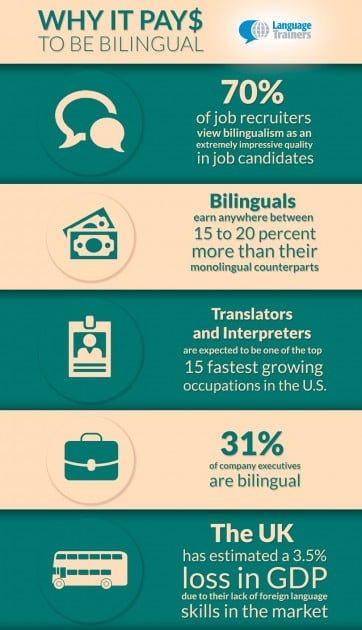Why Companies Won’t Hire Candidates Until They Speak a Foreign Language
These days, it’s no secret that knowing more than one language is a huge benefit.
When it comes to the corporate world, and namely getting that ultimate job, it seems more and more necessary to be able to speak something other than English. This is why predominantly English-speaking countries like the U.K. have seen a sort of crisis of late as monolingualism continues to hurt those seeking out local jobs.
The truth is, even if you have all the right padding on your resume, if you’re missing that vital skill, you just may not get hired. In fact, nearly 70% of job recruiters in America agree that being bilingual is extremely important when it comes to finding jobs.
Before you curse the skies lamenting that one missing piece from your otherwise perfect resume, check out these reasons why many employers simply won’t hire you unless you already have a good grasp of a foreign language.
Language Learning = Time
You may be more than prepared to promise a potential boss that you’re willing to learn a language on the job just to get the job, but most employers understand that picking up a new tongue can be a full-time occupation in itself.
Time is the one great restraining factor of busy corporate workers everywhere, which makes it all too easy for language learning to take second place to everything else, namely your job. For a lot of employers, it’s a risk to hire someone on the mere promise that they will spend evenings and weekends working overtime to conquer a new language, and for most of us, it’s even more difficult to commit to extra time studying – especially after a long work week.
Furthermore, experts say it can take anywhere between 120 to 180 hours of study in order to reach a lowly beginner’s level. If you only have time for an hour of study per day (and most of us don’t even have that), it’ll take you 4 months to solidify basic language skills. Perhaps now you can see why so many possible bosses would rather hire someone who already has a solid grasp of a foreign language.
Language Learning = Commitment
Another reason why a lot of employers balk at the idea of hiring someone who plans on learning a language while on the job is that a credible amount of time and effort has to be put in on your company’s behalf too if they want to ensure you are a successful language learner.
It takes a village to raise a child, and it takes a company to help an employee learn a new tongue. Although a lot of the learning process depends on how much personal time you put into it, your boss will have to step in eventually to make sure you’re staying motivated and getting things done.
And if checking in on your language learning wasn’t enough of a commitment, consider that the company has to wait until you are a sufficiently proficient speaker before giving you choice projects on an international scale. This is why it’s so much easier for most companies to hire a bilingual right off the bat, rather than losing time and money waiting for a current employee to gain language proficiency.
Language Learning = Pressure
Let’s face it, language learning isn’t for everyone, and employers are more than aware of this fact. Unfortunately, if you’ve hated the language learning process in the past, you will most likely hate it just as much (or more) now. And if the idea of studying one of the three influential languages of the world doesn’t come across as appealing at all, a potential boss will pick up on that and not be too keen to hire you.
Experts also say that people generally don’t perform as well under severe pressure. Think about it: if your company hires you with the stipulation that you will become proficient at a language within a year, you’ll experience a great deal of pressure to learn at a certain pace and achieve specific goals for the next 12 months of your life.
Studies further show that learning which involves a lot of memory work (such as language knowledge) isn’t as efficient when an individual is under stress to succeed. Even the best of us can crack under pressure, especially when a job is at stake, and this makes a lot of employers hesitant to hire those who don’t already have the needed language skills.
Studies show that bilinguals can earn anywhere between 15 to 20 percent more than their monolingual counterparts. Not to worry, even if you are monolingual, all is not lost when it comes to scoring that perfect job and a stellar paycheck.
Make sure you’re well prepared to tackle the job market by learning a new language before you even begin the application process. Get started on your road to success by taking a free online placement test to help you determine your level and where to hone your focus. And be sure to invest in some excellent language classes to truly strengthen your language skills. With your newly padded resume in hand, scoring that ideal job should be a breeze!



